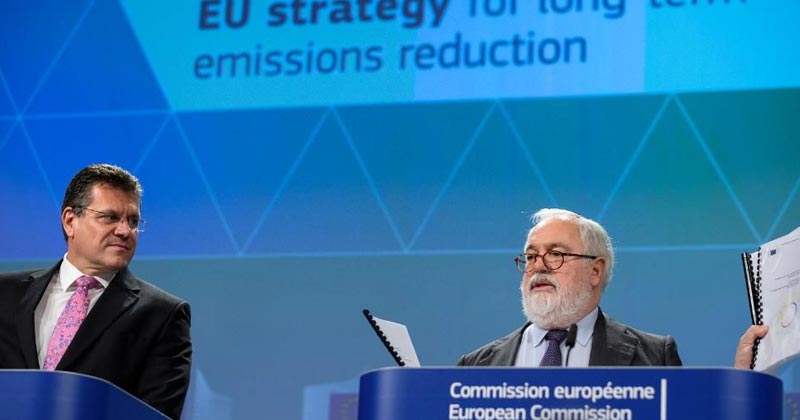When it comes to contributing to the world’s carbon footprint, then China has been reviled for the longest time and rightly so. It is, after all, the country that produces the maximum (quantity of) carbon dioxide in the entire world. Criticism should and also rests with the United States, and truth be told, even India deserves a fair share of bashing when it comes to producing major quantum of carbon dioxide. But is that all?
Could it be that there is another part of our planet that actually forms the not so desirable list- of the top five carbon dioxide producers- in the world?
How often does it occur to us that in a list that’s got nothing fancy about it, there’s also a European country too in there? While to most of us it may not even occur that the Russian Federation is also a massive contributor to increasing the world’s carbon footprint, it does, however, by virtue of this undesirable contribution, tell us a thing or two about Europe.
The concern surrounding Europe toward contributing to the world’s carbon footprint- a trend that shows no sign of abatement at the moment (in the world- isn’t merely restricted with Russia’s massive carbon dioxide output, measured at a massive 1.7 billion metric tonnes in 2017.
In fact, contributing to the clamor surrounding Europe’s hand in the contribution to carbon footprint was perhaps at its peak, and easily, half a decade back in time.
Wondering how? Well, already by 2013, the amount of carbon dioxide emissions from one of the world’s most buzzing and enigmatic of all continents had already hit 36 billion tonnes.
And for the simplest of reasons, the numbers in 2013 were alarming because they had, back then, already shot up by 2.1 percent, a sharp increase vis-a-vis the previous year. Despite the continent being fully developed, not an extensive amount of work had been done toward controlling fossil fuel consumption, the continent renowned for its rich history in the sphere of energy production.
What earned the continent acerbic response from far-reaching corners was the fact that for a continent of small-sized countries, Europe, for the past half a decade, has been packing a significant carbon footprint punch. Germany, France, and Italy were considered among the most polluting countries of the 44 in the historic continent.

But now, it appears that something is finally changing where the sphere of carbon footprint stands.
Believe it or not, but Europe has pledged carbon neutrality by 2050. Yes, in three decades from now, a time frame, that promises a hell lot of change for perhaps much of our land and breathing spaces, there’ll hopefully be the much-needed change that has always been needed given that Europe has pledged carbon neutrality by 2050.
But despite the most telling development, one that may have spurred other parts of the world to think about their respective course of action in an area that is perhaps bleeding for change, there’s also the scope for a great letdown.
It appears that there’s a major roadblock that stands in the way of the continent, despite the confirmation that Europe has pledged carbon neutrality by 2050.
At the present moment, Poland is the continent’s biggest producer of coal, a massive contributor to carbon monoxide, each year. It’s an aspect that is unrelenting and doesn’t seem to offer much hope to the collective promise sought by Europe.
In fact, back in 2016, the Russian Federation, followed by Germany and Poland were found to be the anomalies in an approach that is targeting going green where energy production is concerned.
So far, despite the fact that Europe has pledged carbon neutrality by 2050, Poland’s stand in uniting and standing firmly with the decision of the others hasn’t been possible.
Yet, European leaders, undeterred by Poland, who opted out from the joint goal of the continent, have suggested that they would go ahead with the plan.
While fundamentally, achieving the massive carbon footprint reduction goal sounds tough in both practice or conception, given the fact that most of the world’s fossil fuel-reliant countries are reluctant to consider cutbacks, Europe is trying to bring about the much-wanted change through the inception of what is being called the Green Deal, a sweeping package of ideas to help drive the world’s fight against climate change.
Here are some observations shared by the Washington Post in this regard pertaining to the developing story from Europe:
One aspect of the plan calls for a fund that would send billions of euros to countries that are the most reliant on fossil fuels, including Poland, Hungary and the Czech Republic. According to Reuters, Poland has demanded certain guarantees about the scale of the financing. Other Eastern European countries signed on to the net-zero 2050 target after securing the right to invest in nuclear energy.
“We need to be ambitious if we want to attain our long-term goals,” Frans Timmermans, the former vice president of the European Commission, said at a news conference in Madrid, where more than 190 countries are meeting for an annual climate change conference.


